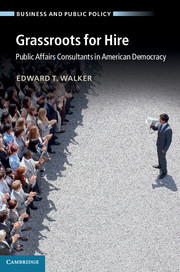Book contents
- Frontmatter
- Dedication
- Contents
- List of figures
- List of tables
- Acknowledgements
- Part I Sources
- 1 Grassroots from the top down
- 2 Defining the field and its implications
- 3 The formation of a grassroots industry
- Part II Structure
- Part III Outcomes
- Appendix 1 Identifying consulting firms (baseline data)
- Appendix 2
- Appendix 3
- Appendix 4
- Appendix 5
- Appendix 6 Models of consulting for non-trade associations
- Appendix 7 Models of consulting for trade associations
- Appendix 8 On public affairs consulting as a profession
- Bibliography
- Public documents referenced
- Index
2 - Defining the field and its implications
Published online by Cambridge University Press: 05 June 2014
- Frontmatter
- Dedication
- Contents
- List of figures
- List of tables
- Acknowledgements
- Part I Sources
- 1 Grassroots from the top down
- 2 Defining the field and its implications
- 3 The formation of a grassroots industry
- Part II Structure
- Part III Outcomes
- Appendix 1 Identifying consulting firms (baseline data)
- Appendix 2
- Appendix 3
- Appendix 4
- Appendix 5
- Appendix 6 Models of consulting for non-trade associations
- Appendix 7 Models of consulting for trade associations
- Appendix 8 On public affairs consulting as a profession
- Bibliography
- Public documents referenced
- Index
Summary
Introduction
The term “grassroots” calls to mind an image of citizen politics rooted in local community. For most, the term conjures up images of local residents joining together to pressure the mayor to support urban redevelopment and affordable housing, citizens in New England getting together on Town Meeting Day to hammer out their local budget, or neighborhood activists mobilizing local parents against undesirable changes to school district policies. Grassroots participation is often seen as a populist response to the failures of markets and ineffective bureaucracies. All of these images hold in common the notion of citizen participation independent of the interests of elites, whether those elites are in government, industry, or powerful civic organizations like foundations or policy institutes. “Grassroots,” then, carries with it an air of authenticity. To be truly “grassroots” is to be taken as legitimate in our democratic system. As the late New York Times columnist William Safire once put it in his well-known Political Dictionary, the grassroots are “the ultimate source of power, usually patronized, occasionally feared.” It carries an “up-from-the-people” meaning that is deeply rooted in American politics and culture, in which the porousness of the American state and rich traditions of civic organizing continually reaffirm the value of public engagement independent of the state and the marketplace.
But that image of grassroots is today – and, to some extent, always has been – more of an ideal than a reality. Consider, for example, the fact that community organizations with greater resources and the public support of local elites are significantly more likely to survive over the long term. Much of the canvassing work done today on behalf of environmental and other public causes is carried out by paid, semi-professional canvassers. Social movements, interest groups, and other forms of citizen political activism tend to require the sponsorship, resources, and/or political support of elite patrons. However, throughout the literature on social movements and civic participation, the assumption remains that grassroots activism is predominantly a weapon of the weak, or a populist tool for everyday citizens to challenge the power of states, corporations, and other powerful organizations that make the decisions that affect their lives.
- Type
- Chapter
- Information
- Grassroots for HirePublic Affairs Consultants in American Democracy, pp. 20 - 50Publisher: Cambridge University PressPrint publication year: 2014



